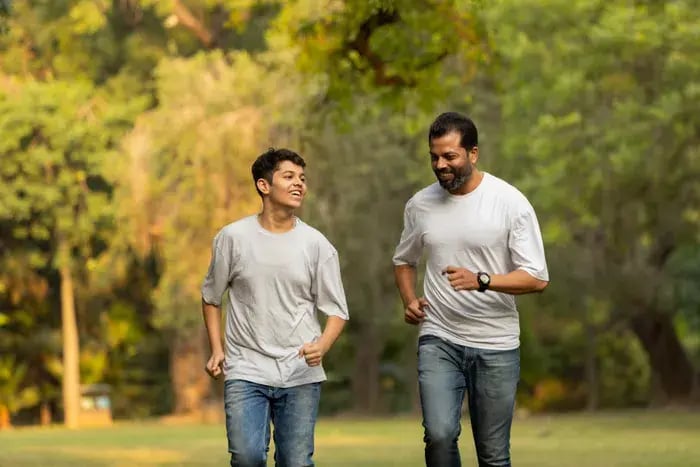Introduction
Given today's fast lifestyle, most families are caught in the hustle of work, school, and technology, which can leave little space for shared time. Such situations weaken relationships. It is necessary to find activities that facilitate bonding and do not harm their physical well-being. Family walks are one simple yet effective activity. Walking also fosters physical fitness while also giving opportunities to the family for talking, laughing, and bonding. It is done with zero expensive equipment or preparation; it only requires soft comfortable shoes and a willingness to go into the open air. A short stroll after dinner or on a weekend morning can be turned into a routine practice that strengthens family bonds as well as inculcates healthy living habits in children. Here are 9 ways family walks contribute to bonding and fitness for children and parents alike.
Emotional Bonding
A walk with the child each day provides time for conversation, free from screens and chores. A relaxed environment allows children to share their thoughts, worries, and experiences. Whether it's school, friendships, or dreams, these conversations help parents create a stronger emotional bond with their children. Children are more likely to share their feelings when they feel heard and understood, and this helps to create a closer bond with family members.
Healthy Habits of Exercise in Children
Children learn by examples, and when they see their parents making efforts to be fit, they too will develop a positive attitude toward physical activity. Walking is the simplest exercise available that develops endurance, strengthens the muscles, and improves health overall. It will help children learn the importance of regular movement so that they keep on moving and never stop being active. It reduces the chance of obesity, enhances cardiovascular health, and maintains energy levels high.
Teaching Goal setting Through Step Challenges
Setting step goals for family walks can make them more engaging and fun for kids. Using fitness trackers or mobile apps, families can monitor their daily steps and set achievable targets. Kids enjoy challenges, and when they see their progress, they feel motivated to continue. Parents can introduce small rewards, like extra playtime or a family movie night, to make goal-setting more exciting. This method makes kids learn how to be disciplined and patient.
Fun in Walks with Games and Activities

Walking would be boring for a toddler. Treasure hunts, number fun activities, or "I Spy" is great for turning a simple walk into an adventure. Parents can make lists to look out for at places they visit, like getting kids to locate birds, flowers of the same color, or specific landmarks on the way. It makes fitness interactive and enjoyable so that kids just love it; they do not perceive exercise as something routine.
Improving Mental Well-being
Walking in open spaces, especially in nature, has a soothing effect on the mind. It does reduce stress, uplift mood, and create a good sense of well-being concerning mental health. When children have to face school pressure or social anxieties, a daily walk is perhaps the time to share their list of worries. Exercise also helps trigger endorphins, often termed as "happy hormones," that work to lower anxiety and depression levels.
Exploring New Routes and Outdoor Spaces
Everyday walking routes tend to get a little monotonous, more so for the children. Stepping out and trying different routes, parks, or nature trails can make the activity interesting for the kids. The parents may give turns for children to select the destination in order to get them interested. Going to a botanical garden, lakefronts, or city park with interesting sights can change the boring nature of walking and become educational exploration.
Creating Opportunities for Social Interaction

Family walks often provide opportunities to interact with neighbors, friends, and fellow walkers. Children learn essential social skills, such as greeting people, engaging in polite conversations, and understanding community interactions. Meeting new people while walking helps kids develop confidence and communication skills, making them more comfortable in social settings. It also promotes a sense of belonging within the neighborhood.
Routine and Discipline
Regularity is one of the aspects of habit, and a fixed time for walking with the family helps children acquire discipline. While deciding on such a routine time, it might be after dinner or early morning, kids begin to understand this concept of structuring their activities. This kind of routine provides regular physical exercise and also instills time management skills. Over time, walking becomes an expected part of daily life, reinforcing the importance of consistency in all aspects of their well-being.
Using Walks as a Digital Detox

With increasing screen time among kids, it is essential to create screen-free moments in their daily routine. A family walk offers a great way to unplug from electronic devices and reconnect with the real world. Encouraging children to observe their surroundings, listen to nature, and engage in face-to-face conversations helps them develop mindfulness. It’s a refreshing break from technology that fosters meaningful connections and enhances their awareness of the world around them.
Deepali is a senior food and wellness writer with over a decade of experience in top media houses, crafting engaging narratives. She is a professional home baker and loves exploring food from every corner of the world to reading cookbooks. She believes a healthy lifestyle is a combination of both mental and physical fitness. Her goal always remains to keep moving, eating seasonal and practicing gratitude.
The views expressed are that of the expert alone.
The information provided in this content is for informational purposes only and should not be considered a substitute for professional medical advice, diagnosis, or treatment. Always seek the advice of your physician or another qualified healthcare provider before making any significant changes to your diet, exercise, or medication routines.
References
https://www.parents.com/fun/vacation/ideas/8-fun-car-game-ideas/
https://www.thepersonal.com/blog/-/road-trip-with-the-kids-9-fun-car-games-to-play
















